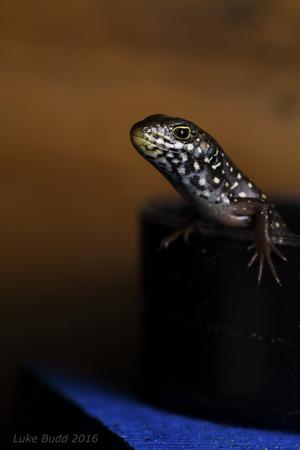Research led by the University of Tasmania has found the amount of food an expecting mother lizard consumes can determine how well her offspring do at solving problems.
Conducted by the School of Natural Sciences, the study showed that food consumption by female lizards during gestation influenced their offspring’s decision-making ability in a number of important tasks.
Females who ate less during gestation produced offspring that were better at solving problems related to avoiding predators.
Offspring from mothers who consumed higher portions of food were more successful at solving problems related to finding food.
Kirke Munch, the paper’s primary author and a PhD student from the University’s School of Natural Sciences, said the research was a first of its kind study.
“It is well known that the environment a mother experiences when she is pregnant can have significant effects on how her offspring look and behave,” Ms Munch said.
“However, our understanding of how these experiences influence the development of her offspring’s cognitive ability is less understood, particularly outside mammal species.
“This is one of the first studies that shows how much resources a female has access to during gestation, can have significant effects on her offspring’s cognitive ability.”

Liopholis whitii lizard by Luke Budd
Dr Geoff While, Lecturer in Behavioural and Evolutionary Ecology and co-author of the paper, highlighted a possible explanation to the findings.
“The amount of resources an offspring experiences in early life can evoke trade- offs in the developing offspring – potentially enhancing one cognitive domain at the expense of another - but this requires further research,” Dr While said.
The study forms part of Ms Munch’s PhD, which focuses broadly on cognitive development in reptiles.
“I chose to examine reptiles because they have been relatively unstudied in the context of research into cognition,” Ms Munch said.
Reptiles are particularly important in understanding cognitive evolution because they represent a group that is basal to birds and mammals and thus provide a nice comparative system for understanding how cognition has evolved. This research is only the tip of the iceberg – there is still a lot we don’t understand and a lot more we have to learn.”
Liopholis whittii lizards were used to inform the study, and were fed mealworms throughout its duration. The results were published in the article Maternal effects impact decision-making in the viviparous lizard which can be accessed here.
http://rsbl.royalsocietypublishing.org/lookup/doi/10.1098/rsbl.2017.0556
Interested on conducting your own research? Apply now to become a research student.
Other co-authors of the research are:
Thomas Botterill-James, Iain Koolhof, Benjamin Halliwell and Erik Wapstra from the University of Tasmania, and Daniel Noble from the University of New South Wales.
